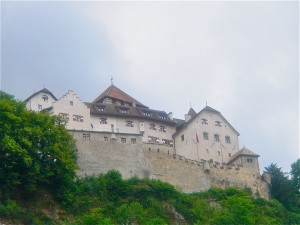Tucked away in the Alps between Switzerland and Austria, Liechtenstein is described by its official tourism website as “the jewel at the pulse of Europe … traditional and modern, just the right size and open to the world, athletic and sensual”. It is the world’s 7th smallest country by population; her people would take up less than half of Wembley Stadium. A principality of the Holy Roman Empire since 1719, Liechtenstein gained its sovereignty in 1806 when it joined Napoleon’s Confederation of the Rhine, and full independence in 1815 after the end of the Napoleonic Wars.
Since then it has become the world’s richest country by GDP per capita (at purchasing power parity), according to the CIA World Factbook, a position owed largely to a strong financial services sector and its status as a notorious tax haven. The country was the centre of a 2008 scandal in which various countries, in particular Germany, began to investigate this thriving industry. This drove a furious Crown Prince Alois to state that “Germany has clearly failed to understand how one behaves towards a friendly state”. Despite these events, though, it is usually one of the world’s least newsworthy countries.
For God, Prince, and Fatherland
However, Liechtenstein is also the closest thing that Europe has to an absolute monarchy. Certainly, it is the only state in Europe in which the power of the monarchy has actually increased in recent years. The Prince has the right to appoint judges, quash legal investigations, dismiss the government, and pass emergency legislation which does not violate certain fundamental rights. Most importantly in Liechtenstein’s recent history, the Prince was granted extensive additional political power in a 2003 constitutional referendum, giving him an effective veto against any law passed by Parliament. Article 9 of the Constitution of the Principality of Liechtenstein states that “Every law shall require the sanction of the Reigning Prince to attain legal force”.
Perhaps surprisingly, the constitutional referendum with a turnout of 88% granted these sweeping powers to the Prince with a substantial majority of 64.3% in support. A rival and concurrent proposal that would have limited the Prince’s powers achieved a mere 16.6% of the vote. During the referendum campaign, Prince Hans-Adam II capitalised on his popularity by threatening to leave Liechtenstein for Austria if the referendum was not passed.
While such a move would have incurred heavy costs, it was not an empty promise. The Liechtenstein dynasty is named after Liechtenstein Castle in Lower Austria, which is still held by the family. In fact, the Princely Family of Liechtenstein did not take up permanent residence in the Principality of Liechtenstein until 1938.
A Bloodless Revolution?
Despite the resounding victory in the 2003 constitutional referendum, the monarchy of Liechtenstein faces some dissent from within the country. Article 64 of the Constitution of Liechtenstein states that a constitutional referendum in Liechtenstein can be triggered by a petition of no fewer than 1500 registered voters. On May 10th , democracy activists in Liechtenstein presented a petition of 1,732 signatures calling for a referendum that would take away the Prince’s power of veto. As the threshold for a constitutional referendum was passed, a vote must now be held. While no date has yet been formally established, the website of Demokratiebewegung in Liechtenstein (Democracy Movement in Liechtenstein) predicts that Liechtenstein will go to the polls on July 1st.
The current campaign against the Princely veto comes in the wake of the acrimonious September 2011 referendum concerning abortion. The referendum, if passed, would have legalised abortion within the first twelve weeks of pregnancy. While Liechtenstein is majority Roman Catholic, and Roman Catholicism is the state religion, a separate referendum in May of the same year had reaffirmed a parliamentary decision to legalise homosexual partnerships by an overwhelming 68.8% of the vote.
The 2011 abortion referendum campaign, however, saw an intervention by Prince Alois, the Regent and Hereditary Prince of Liechtenstein, who threatened to exercise his veto if the referendum passed. While the motion narrowly failed, with 52.3% against, the Prince’s intervention was blamed for reducing turnout and ultimately leading to the result: the turnout for the abortion referendum was 61%, compared to 74.2% for the May referendum. Indeed, Sigvard Wohlwend, a spokesman for Demokratiebewegung in Liechtenstein, stated that “the referendum was doomed” by the Prince’s veto threat.
Princely intervention has also been a theme in the recent attempt to remove the Prince’s veto. In a speech to parliament on March 1st, Prince Alois threatened that the royal family would “completely withdraw from public life” if the referendum passed, stating that “the royal family is not willing to undertake its political responsibilities unless the prince … has the necessary tools at his disposal”. The anti-veto campaign has stated prominently that removing the veto is their only goal, a tacit recognition that the monarchy remains popular in Liechtenstein and that an attack on the entire institution would jeopardise their chances of success. Nevertheless, according to Wilfried Marxer, political scientist and director of the Liechtenstein Institute, “opposition against the proposal of the initiators is widespread and the debate goes more on monarchy in principle than the specific article in the constitution which is the goal of the initiative. Thus the popular vote is shifting from a single issue vote to a fundamental decision on monarchy in Liechtenstein.”
Ironically, should the referendum pass, it could be vetoed; the only legislation in Liechtenstein that is not subject to the Prince’s veto is the abolition of the monarchy.




